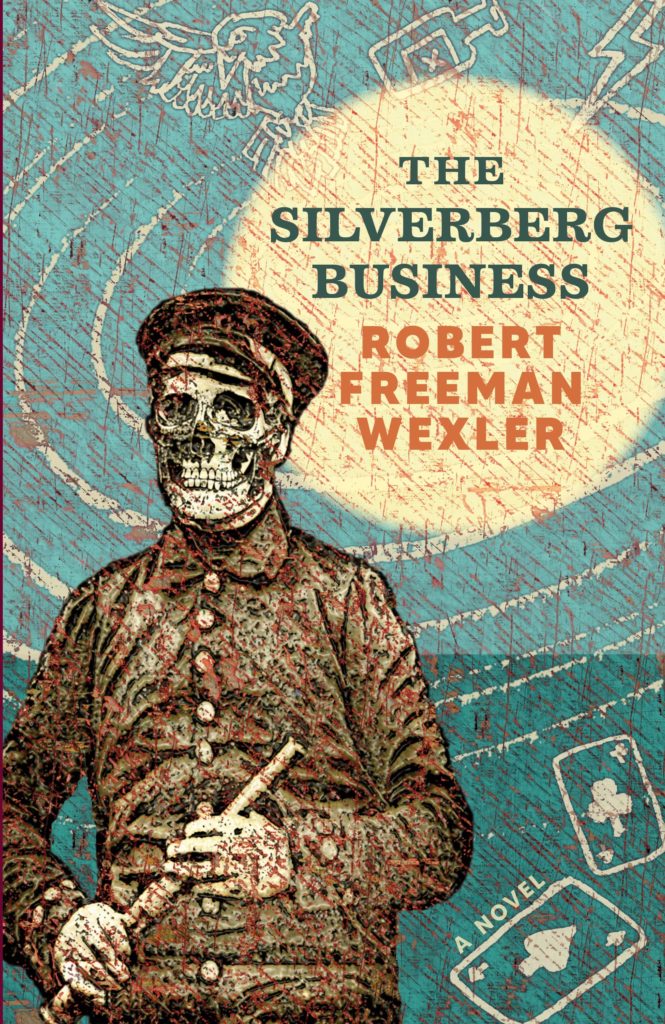The Silverberg Business, by Robert Freeman Wexler, is weird. That seems like kind of a given, a lot of books in horror and darker fantasy are “weird,” but there’s an art and mechanics to the weird. It’s an intricate balancing of internal logic, surreal images, and pacing that few can master. In Wexler’s work, the weird is a thing that comes on subtly, slipping from simple eccentricities and a few vague elements of the supernatural into a full-on surreal nightmare where even the most benevolent elements are things that will haunt your dreams for days to come. With its methodical pace, horrifying visuals, and gradual acceptance of the weirder elements, The Silverberg Business shows Wexler’s mastery of the weird and crafts an unusual but striking novel about land and home blending history with his own unnerving imagination.
At a friend’s wedding in his home of Galveston, TX, a private investigator named Shannon is given what seems like a straightforward case. Rabbi Cohen, leader of Galveston’s Jewish community, tasks Shannon with finding Silverberg, a businessman who vanished without a trace in the nearby town of Victoria along with a group of con artists supposedly soliciting donations for a future colony of Romanian Jewish refugees. At first, the case seems fairly open and shut–find Silverberg, find the fraudsters, and recover the money–but Shannon finds himself frustrated and disoriented at every turn, first by the eccentric inhabitants of Victoria that include a group of vigilante musicians and a guitar-playing Marshall, and then by far more sinister elements: An alternate Texas full of infinite buildings and skull-headed doppelgangers, eyeless faces smelling of “sea-rot” that appear in sand dunes, and at the center of it all a sinister red-eyed gambler named Stephens with mysterious plans for all of it. It’s clear Shannon’s stumbled on something very big and very ancient, but the ultimate questions are, what are its plans for him and the missing Silverberg?
The strangeness in The Silverberg Business creeps in slowly. The book begins with Shannon recounting a weird dream and becoming frightened by a sinister figure he sees while eating breakfast, and the early chapters outline Victoria more as a place of eccentricity than any outright weirdness, with its guitar-playing marshall, sinister legendary card-sharp, and gigantic cowboys so absorbed in philosophical arguments that they block the sidewalk. Wexler is great at making things feel sinister and shadowy while nothing overtly sinister or shadowy is going on– other than the upsetting figure of Stephens who keeps popping up as a person of interest in Shannon’s investigation and the missing (and probably dead) Nathan Silverberg, there’s not too much out of the ordinary–but there’s the unshakable feeling that something’s going on under the surface. As Shannon gets pulled in deeper, that creeping strangeness gets more and more overt, giving the sense that the detective was always kind of out of his depth.
What this also does is slowly build a lot more of the weird and sinister elements of the plot. Stephens is a character only really glimpsed for the first two thirds of the book, a Satan figure with white hair and eyes the color of dried blood who slides along the edges of things, never at the center, never directly involved until Shannon has enough power and evidence at his back to go after him directly. The weird sand-dune mouths and the odd crab-things connected with them appear first while Shannon is wandering around the desert on Silverberg’s trail and possibly hallucinating, and then become more sinister the more significant detail is revealed about them. It works in the reverse, too, with Shannon’s bizarre encounter with a group of skull-headed poker players in an infinite saloon seeming unusual and terrifying at first, but growing more inviting the more blanks are filled in about Shannon’s dreams and their connection to the skull heads. Wexler’s work moves on a logic all its own, something that’s inherently felt without needing to be spelled out for the reader, something the creeping strangeness and feeling of the encroaching weird only intensify by degrees, creating the sensation of something trying to break through, but in a way most wouldn’t notice.
All of which fits in perfectly with the message the book is trying to convey. In The Silverberg Business, everything is connected to the concept of home in some degree–Stephens is trying to find a place he can let the sinister “crab things” and their sand-dune totems hostilely terraform the landscape, the con run on Silverberg by Stephens and his associates is meant to find a home for Romanian Jewish refugees, and even Shannon finds himself drawn back to his home of Galveston, his family, and the Jewish community on the island where he grew up (Shannon’s name really being Chaunun, his family having changed it upon the advice of an immigration official). There’s a sense that things have always existed, that all these events have connections not just to each other but to something older and deeper, something that ties it all to the land. With the slow-building strangeness and the feeling that something bigger and weirder is going on just beneath the surface of Texas, none of the weird elements need be explained–they can just sort of be, allowing them to preserve their strangeness while also remaining deeply connected to the world and its timeline.
The Silverberg Business is a unique and bizarre work, featuring all the chaos of a nightmare or an acid trip with the methodical and precise control of narrative to keep it from pitching fully into outright hallucination. Its slow, sinister build offers readers a creeping sense of dread and an introduction to a world much like the America we know, but with insane details and an ancient threat completely unique to the book. Its subtle buildup of strangeness, understanding without the need for explicit explanations, and melding American history with more existential themes and horror make this a must-read for pretty much anyone who has an interest in weird fiction.




